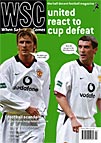 Despite their recent victory over England, Australian football is still desperate for reform to enable a more competitive national side. Mike Ticher explains
Despite their recent victory over England, Australian football is still desperate for reform to enable a more competitive national side. Mike Ticher explains
You could perhaps forgive Remo Nogarotto for a bit of hyperbole in the excitement of Australia’s 3-1 win over England at Upton Park in February. “This is the first chapter in the renaissance of Australian soccer,” the chairman of the sport’s governing body enthused. “The team has come of age and so has the sport.”
The round-ball game has trumpeted so many comings of age in the past 30 years or so that it’s a wonder Soccer Australia hasn’t adopted a puking teenager as its logo. So it was hard to find too many voices to back Nogarotto’s optimistic claim in the aftermath of what was, after all, only a friendly.
Which is not to say the local media did not relish the chance to wallow in Sven-Göran Eriksson’s discomfort and to reiterate the rather tired but undeniable point that Australia, on the whole, tends to do better than England at sport. Several newspapers felt the occasion deserved special pull-outs and commemorative posters, coming as it did in the brief lull between the Davis Cup and the cricket World Cup, when Australia had had no sporting triumph to celebrate for at least two weeks.
While all of that may produce a familiar sickening feeling to an English audience, it may make it easier if you think of it as a long overdue victory for soccer itself, rather than for Australia. The 1974 World Cup player, former Socceroos captain and now TV pundit, Johnny Warren, recently released his autobiography, provocatively titled Sheilas, Wogs and Poofters – the traditional characterisation of soccer players by mainstream Australian sport for many years. Soccer is still fighting that battle for credibility against the other football codes, but, perhaps more significantly these days, also against the constant din of the Premiership and the other European and South American football on cable TV.
“Chest-thumping by Australian sporting teams is fast becoming something of a national shame,” admitted the Sydney Morning Herald’s long-suffering soccer correspondent. “But please excuse the Socceroos for wanting to rub this one in – it’s been a long time coming.”
Just how long was underlined by the death two weeks after the England game of the former Socceroos coach Eddie Thomson, once of Hearts and Aberdeen. Thomson, who died of cancer just before his 56th birthday, was the coach the last time Australia played England, a 1-0 defeat in Sydney in June 1991. It wasn’t so much the fact that Australia had never beaten England in any remotely serious match that gave the Upton Park result its resonance, but that since Thomson’s side lost to a motley crew of Graham Taylor’s design, Australia have played barely a dozen senior games that really counted against anyone. They were all World Cup qualifiers and, when it came to the moments of truth in three tournaments running, they were all lost.
The short-term impact of this result will be modest, though not to be sniffed at for a federation that is all but bankrupt (morally, as well as financially). Sponsorship will be easier to come by and better teams will want to take them on – Serbia and Portugal have so far been mentioned as likely candidates. And, like Nigeria and Jamaica, the Australians should find that playing “home” games in London in future guarantees them a decent crowd, respectable opposition and the chance to use their best players on a regular basis, despite the best efforts of Terry Venables. For the national side, for once, there is something to look forward to.
The mildly hysterical reaction to the England game and the huge ratings for last year’s World Cup (when Australia at last enjoyed a major international event in its own time zone), despite the absence of the Socceroos, provides yet more evidence that there is a big constituency for soccer that is still relatively untapped. But the desperately moribund state of the national league, where some long-standing clubs have recently recorded crowds of “about 500”, does not suggest that that potential will be realised any time soon at the local level.
One game in London, however exhilarating, will make no difference to the domestic league. To clean out that stinking mess doesn’t demand yet another renaissance so much as a reformation, preferably carried out with the kind of single-minded intolerance that leads to the wanton destruction of icons and fiery death of recalcitrants in the town square.
From WSC 194 April 2003. What was happening this month